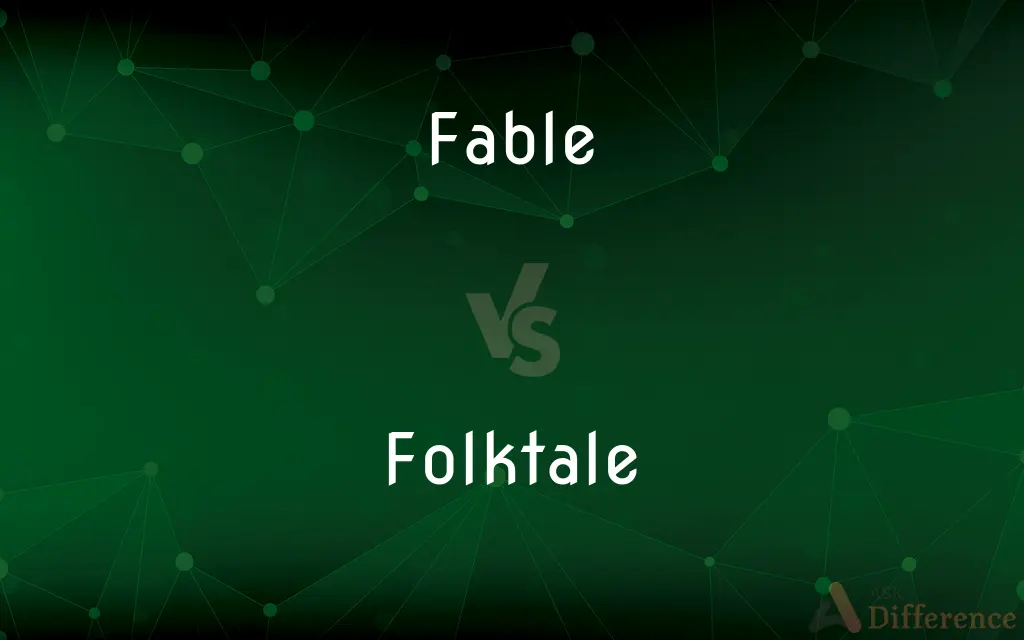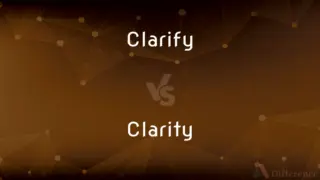Fable vs. Folktale — What's the Difference?
By Tayyaba Rehman — Updated on September 19, 2023
A "Fable" is a short story that teaches a moral lesson, often featuring animals as characters. A "Folktale" is a traditional story passed down through generations, often involving humans and sometimes supernatural elements.

Difference Between Fable and Folktale
Table of Contents
ADVERTISEMENT
Key Differences
A "Fable" is a specific type of story designed to teach a moral or ethical lesson. These stories are usually quite short and often feature animals, objects, or forces of nature that are anthropomorphized, or given human characteristics. In contrast, a "Folktale" is a traditional narrative that has been passed down orally through generations. Folktales can feature humans, animals, or even supernatural entities, but they don't always aim to teach a moral lesson.
While both Fables and Folktales are fictional and may serve to entertain or educate, they serve different purposes. Fables are almost always didactic, aiming to convey a specific moral or lesson to the listener or reader. Folktales, on the other hand, serve more often to reflect cultural norms, traditions, or beliefs, and may or may not have a clear moral message.
From a grammatical standpoint, both "Fable" and "Folktale" are nouns, but the ways in which they are used in sentences can differ due to their distinct roles in storytelling. While you can say, "The fable teaches us not to lie," emphasizing the lesson, you could say, "The folktale has been passed down through my family," emphasizing tradition.
In terms of length and complexity, Fables are generally shorter and simpler, designed for quick consumption and easy understanding of the lesson they aim to impart. Folktales, conversely, can vary widely in length and complexity, often evolving over generations and sometimes forming the basis for more elaborate myths or legends.
Comparison Chart
Primary Purpose
Moral Lesson
Cultural Tradition
ADVERTISEMENT
Common Characters
Animals
Humans or Supernatural
Grammatical Use
Noun
Noun
Length
Generally Short
Varies
Moral Lesson
Almost Always
Optional
Compare with Definitions
Fable
A short narrative designed to teach a moral lesson.
The fable of the tortoise and the hare teaches patience.
Folktale
May or may not include a moral lesson.
The folktale was entertaining but didn't necessarily teach a lesson.
Fable
Didactic in nature, aiming to educate.
The fable ends with a clear message about honesty.
Folktale
Reflects cultural norms or traditions.
The folktale gives insight into the beliefs of the community.
Fable
Often features anthropomorphized animals or objects.
In the fable, the sun and the wind argue about who is stronger.
Folktale
A story passed down through generations, often orally.
My grandmother told me a folktale that her grandmother told her.
Fable
Usually simple and concise.
The fable was short but impactful, leaving the children with something to think about.
Folktale
Can feature humans, animals, or supernatural elements.
The folktale involved a clever rabbit outsmarting a wolf.
Fable
A genre of literature focused on moral teachings.
Aesop's fables are classic examples of this genre.
Folktale
Often evolves over time and varies by region.
The same folktale has different versions in different cultures.
Fable
Fable is a literary genre: a succinct fictional story, in prose or verse, that features animals, legendary creatures, plants, inanimate objects, or forces of nature that are anthropomorphized, and that illustrates or leads to a particular moral lesson (a "moral"), which may at the end be added explicitly as a concise maxim or saying. A fable differs from a parable in that the latter excludes animals, plants, inanimate objects, and forces of nature as actors that assume speech or other powers of humankind.
Folktale
A story or legend forming part of an oral tradition.
Fable
A usually short narrative making an edifying or cautionary point and often employing as characters animals that speak and act like humans.
Folktale
A tale or story that is part of the oral tradition of a people or a place.
Fable
A story about legendary persons and exploits.
Folktale
A tale circulated by word of mouth among the common folk, especially one forming part of the tradition of a culture.
Fable
A falsehood; a lie.
Folktale
A tale circulated by word of mouth among the common folk
Fable
To recount as if true.
Fable
To compose fables.
Fable
A fictitious narrative intended to enforce some useful truth or precept, usually with animals, etc. as characters; an apologue. Prototypically, Aesop's Fables.
Fable
Any story told to excite wonder; common talk; the theme of talk.
Fable
Fiction; untruth; falsehood.
Fable
The plot, story, or connected series of events forming the subject of an epic or dramatic poem.
Fable
To compose fables; hence, to write or speak fiction; to write or utter what is not true.
Fable
To make up; to devise, and speak of, as true or real; to tell of falsely; to recount in the form of a fable.
Fable
A Feigned story or tale, intended to instruct or amuse; a fictitious narration intended to enforce some useful truth or precept; an apologue. See the Note under Apologue.
Jotham's fable of the trees is the oldest extant.
Fable
The plot, story, or connected series of events, forming the subject of an epic or dramatic poem.
The moral is the first business of the poet; this being formed, he contrives such a design or fable as may be most suitable to the moral.
Fable
Any story told to excite wonder; common talk; the theme of talk.
We grewThe fable of the city where we dwelt.
Fable
Fiction; untruth; falsehood.
It would look like a fable to report that this gentleman gives away a great fortune by secret methods.
Fable
To compose fables; hence, to write or speak fiction ; to write or utter what is not true.
Vain now the tales which fabling poets tell.
He fables, yet speaks truth.
Fable
To feign; to invent; to devise, and speak of, as true or real; to tell of falsely.
The hell thou fablest.
Fable
A deliberately false or improbable account
Fable
A short moral story (often with animal characters)
Fable
A story about mythical or supernatural beings or events
Common Curiosities
Are Fables always short?
Fables are generally short and concise to quickly convey a moral lesson.
What is a Fable?
A Fable is a short story that teaches a moral lesson, often featuring animals as characters.
Do all Fables have animals in them?
While many fables feature animals, it's not a strict requirement.
Do Folktales always teach a lesson?
No, Folktales may or may not teach a moral lesson.
How are Folktales passed down?
Folktales are often passed down orally through generations.
Can Folktales change over time?
Yes, Folktales can evolve and adapt over time.
What's another term for Fable?
Parable is another term that often means a similar kind of moral story.
What is a Folktale?
A Folktale is a traditional story passed down through generations that reflects cultural norms or traditions.
Can a Fable also be a Folktale?
While they serve different purposes, some stories might be considered both a Fable and a Folktale depending on the context.
Can Folktales be long?
Folktales can vary in length, from short stories to long epics.
Who usually writes Fables?
Fables can be written by anyone but are often attributed to known authors like Aesop.
Are Fables only for children?
While often aimed at children, the moral lessons in Fables can apply to adults as well.
Are Folktales based on real events?
Folktales are generally not based on real events but may incorporate some elements of truth.
Do all Fables end with a stated moral?
Many fables end with a clearly stated moral, but it's not a strict requirement.
What's another term for Folktale?
Legend or myth can be similar in nature to a Folktale, depending on the story.
Share Your Discovery

Previous Comparison
Clarify vs. Clarity
Next Comparison
Wasp vs. BeeAuthor Spotlight
Written by
Tayyaba RehmanTayyaba Rehman is a distinguished writer, currently serving as a primary contributor to askdifference.com. As a researcher in semantics and etymology, Tayyaba's passion for the complexity of languages and their distinctions has found a perfect home on the platform. Tayyaba delves into the intricacies of language, distinguishing between commonly confused words and phrases, thereby providing clarity for readers worldwide.
















































